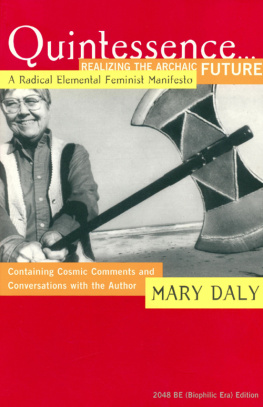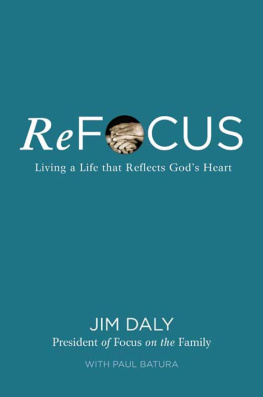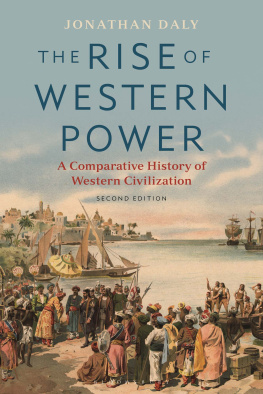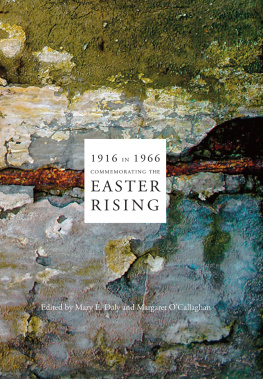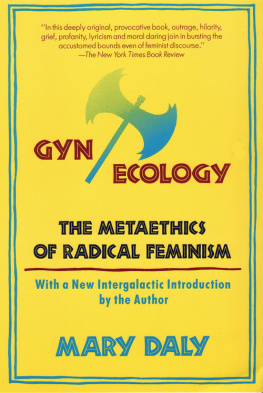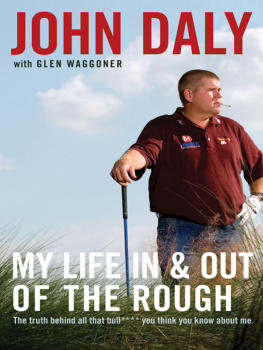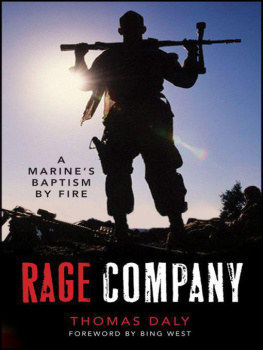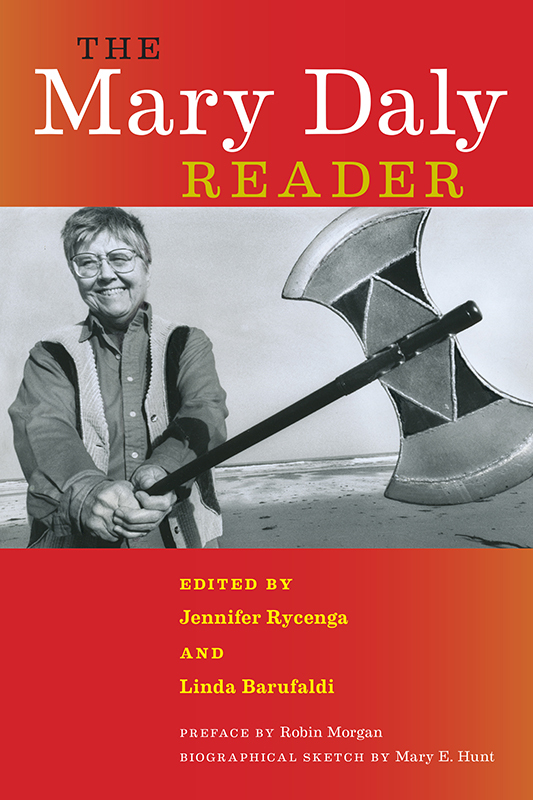
The Mary Daly Reader
The Mary Daly Reader
Mary Daly
Edited by Jennifer Rycenga and Linda Barufaldi
Preface by Robin Morgan
Biographical Sketch by Mary E. Hunt

NEW YORK UNIVERSITY PRESS
New York
NEW YORK UNIVERSITY PRESS
New York
www.nyupress.org
2017 by New York University
All rights reserved
Cover photograph by Gail Bryan 1998
References to Internet websites (URLs) were accurate at the time of writing. Neither the authors nor New York University Press is responsible for URLs that may have expired or changed since the manuscript was prepared.
Library of Congress Cataloging-in-Publication Data
Names: Daly, Mary, 19282010, author. | Rycenga, Jennifer, editor.
Title: The Mary Daly reader / Mary Daly ; edited by Jennifer Rycenga and Linda Barufaldi ; preface by Robin Morgan ; biographical sketch by Mary E. Hunt.
Description: New York : NYU Press, 2016. | Includes bibliographical references and index.
Identifiers: LCCN 2016024252| ISBN 9781479892037 (hbk : alk. paper) | ISBN 9781479877768 (pbk : alk. paper)
Subjects: LCSH: Daly, Mary, 19282010. | FeministsUnited States. | Women theologiansUnited States. | Feminist theologyUnied States.
Classification: LCC HQ1413.D23 A25 2016 | DDC 305.420973dc23
LC record available at https://lccn.loc.gov/2016024252
New York University Press books are printed on acid-free paper, and their binding materials are chosen for strength and durability. We strive to use environmentally responsible suppliers and materials to the greatest extent possible in publishing our books.
Manufactured in the United States of America
10 9 8 7 6 5 4 3 2 1
Also available as an ebook
To Mary Daly herSelf, whose brilliance transformed Philosophy and whose passion Sparked the minds of her time and beyond.
Overcoming the silencing of women is an extreme act, a sequence of extreme acts.
Mary Daly, Gyn/Ecology
Contents
Robin Morgan
Mary E. Hunt
Jennifer Rycenga and Linda Barufaldi
Robin Morgan
I can almost feel her sitting across from me as I write this, snarling lovingly that its unfair of me to outlive her so she cant defend herself. Ah Mary, I come to praise you, never fear. As she might say, if you cant be there in the flesh, being there in spirit is the next best thingand actually, who dares to say theyre different?
We had a forty-year friendship, filled with collegiality, work, arguments, work, gleefully making trouble for the patriarchy, arguments, work, plotting, giggles and guffaws, workand arguments. There were numerous bonds, doubtless saving the world chief among them. But one great bond was a shared love of good puns, and another was, well, intellect: we clung together especially during periods when the womens movement went through anti-intellectual fads.
Whenever we fell out with one anotherdifficult twins was Marys nickname for our friendshipwe somehow always fell back in again. To the very last. And if we hadnt seen one another or spoken by phone for months, somehow we always picked right up where wed left off, as if no time had intervened.
Of all the memories, two stand out, one public and one private.
The public recollection is of the time when (yet again) Boston College was (yet again) persecuting her for some perceived (yet again) offenseperhaps this time it was, as she waggishly called it, moral turpentine. In any event, there was a rally in some BC gymnasium packed with people, and I recall starting my support speech with the war cry, Sisters, we meet on bloody Jesuit ground!
The roar in reply from the audience met with Marys approvalthat memorable Irish grin. Afterwards, she said she decidedly liked my part of the rally best, and since then would sign letters and books to me, with love, respect, admirationand indigestion. The lack of a qualifier in her praise was unsettlingly delightful.
The private, prized memory is of a time, probably in the 1970s, when I came to give a speech at Harvard and do a benefit for... well, for some group doing excellent work, Im sure. Battery refuges. Rape crisis centers. Underground railway stations for then illegal abortions. Womens centers. Whatever.
I stayed overnight at Marys. Stayednot slept.
Because I had brought her a largeish bottle of Irish Mist as a house gift, and we sat up all night longpolishing off the entire bottlewhile (what else?) arguing.
This time is was Aquinas versus Dante.
Marys position, or rather imperious edict, was that all the philosophy and theology of the Divina Commedia was already evident in Aquinas, so there was really no need for the poem, which was just one big plagiarism. She got that twinkle in her eyes, knowing this would drive me crazy.
As a poet, I was indeed apoplectic: Its a POEM, Mary, forgodsake, a great work of art, the origin of certain language and imagery that has transformed the global collective unconscious. And it was the first great work written in the vulgate, so that ordinary folks (at least those who were literate) could read ita radical act! Finally, I wound up with Art goes where theology cant. And outlasts it.
Aha. Touch! Now I could twinkle.
Mary was apoplectic.
Another round of Irish Mist.
Finally, we dissolved in rib-aching, roll-on-the-floor-scare-the-cat laughter, agreeing that there was a nonplace for both Dante and Aquinas in the nonheaven we nonbelieved in and which we would jointly assault if we did.
The hilarity came when, at around 7 a.m., we realized that (a) we were drunk as loons yet famished for breakfast, and (b) if anyone had overheard such infamous manhaters quarreling over whose guy was best, our reputations would have been totally destroyednot to speak of our dignity, which was already in shreds.
Mary was, of course, brilliant, funny, brave, a word-lover, angry, loving, bitter, both vulnerable and invulnerablewith an ego the size of Montana, which, by the way, shed earned. Passionately loved by many womenthose who knew the woman and those who knew her solely through her booksshe still was underestimated in her time. But her work will survive to transform future generations. She was a feminist philosopher, a radical theologian, a formidable professor, an activist agitatorand at times, a de facto stand-up comic.
The essays in this important book are samples of her range, the ferocity of her wit, and the depth of her daring. Read and savor them. Then go read her books. If rereading, you will find new revelations and insights in returning to old friends. If encountering them for the first time, welcome to the brain orgasms of Dalyworld.
For me, well, I miss herher irascibility, humor, unique vision, her long telephone messages that blithely used up all my answering machine tape, the tenderness that lay beneath that tigress exterior. She was my friend, colleague, sister. She was my difficult twin, and I loved her.
Im grateful to the women who assembled this volume, Team Mary, for the jewel chest that this book is. Now its in your hands. Cherish it.
May 4, 2012, New York City
Mary E. Hunt
Mary Daly was born of working-class Irish American parents in Schenectady, New York, where she grew up. Her father, Francis X. Daly, was a salesman; her mother, Anna Catherine Daly, would prove a lifelong support and friend to Mary, her only child.
Daly was educated in Catholic schools and graduated with a degree in English from St. Rose College in Albany, New York, in 1950, and an MA in English at The Catholic University of America in 1952. She earned her first doctorate in religion at St. Marys College, Notre Dame, Indiana, in 1954, at a time when women were unwelcome in most U.S. doctoral programs in theology. After a few years of teaching, she supplemented her first PhD with two more doctorates in 1963, one in philosophy and the other in sacred theology from the University of Fribourg in Switzerland. In Fribourg, a lot of her studies were in Latin, a language skill that stood her in good stead in later creative endeavors. Her inveterate ability to articulate new ideas, coin new words, and redefine others always featured careful, critical attention to etymology.
Next page

